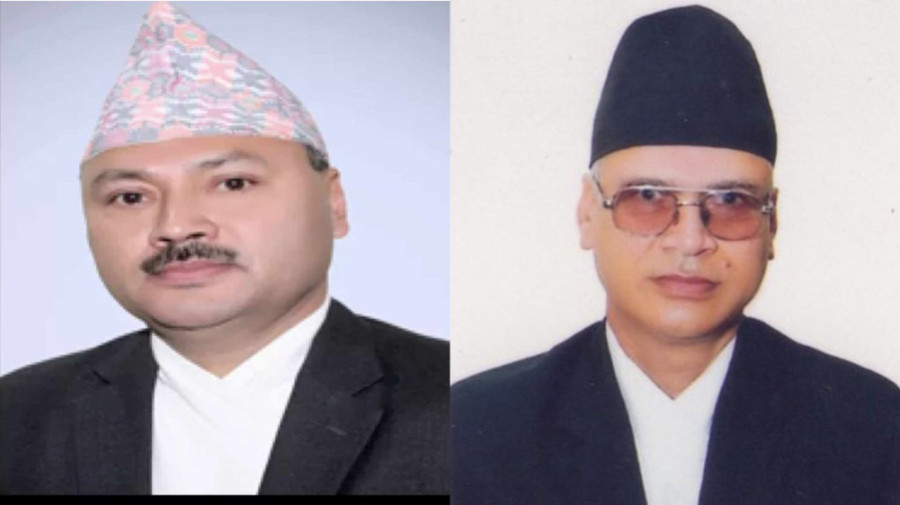National
Judicial Council picks two justices ignoring lawyers’ protest
Nripa Dhwaj Niraula and Nityananda Pandey selected while Nepal Bar Association alleges corruption.
Post Report
Ignoring Nepal Bar Association’s protest, the Judicial Council on Friday recommended two high court chief judges as Supreme Court justices.
Chief Justice Bishowambhar Prasad Shrestha-led council picked Nripa Dhwaj Niraula and Nityananda Pandey for the top court while lawyers staged sit-in on the council premises, warning against the appointments.
The council, which had been making attempts to pick the justices for a month, just a week before Shrestha retirement. However, it could only agree on two names even though the 21-strong top court needs six justices to fill the vacant positions. In addition, 16 judges’s positions remain vacant in various high courts.
Niraula and Pandey, who are currently chief judges at the Patan High Court and the Tulsipur High Court, respectively, must undergo parliamentary hearings before their appointments can be finalised.
The NBA, however, has citicised the recommendations alleging the council for picking the two names in exchange of money.
“The manner in which the recommendation has been made clearly shows there have been financial dealings in the selection,” Gopal Krishna Ghimire, president of the lawyers’ body, told the Post. “The present judicial leadership is arbitrary and anarchic. Its actions have both saddened and angered us.”
The association has been staging regular protests after the council revised its regulations in September last year, adjusting the judges’ rankings. According to the amendment published in the Nepal Gazette on September 20, the chief registrar of the Supreme Court or the council secretary, if appointed a high court judge, would be ranked right after the chief judge of the high court.
The association has demanded the provision be revoked, describing it as regressive, biased, discriminatory, arbitrary, and unconstitutional and arguing that it contradicts the principles established by Supreme Court’s verdicts. It claims that the amended regulations unfairly demote judges appointed from among lawyers, placing them below career judges in the hierarchy.
In response to the protests, the judiciary's leadership constituted a five-member committee on September 2 to settle the matter through dialogue. Prakash Man Singh Raut, the senior-most justice of the Supreme Court, led the panel.
The panel, however, failed to find a meeting point. The Nepal Bar Association refuses to budge from its demand to revert the changes.
Ram Prasad Bhandari, a member of the council, Ghimire, Anjita Khanal, general secretary of the association, and Yam Bahadur Budha, secretary at the council, were members of the panel.
The Raut-led panel failed to resolve the dispute. Raut and Bhandari disagreed with the association’s demand to revert the amendment, while Budha remained neutral. As a result, two separate reports were presented to Shrestha. One from the Raut-led faction, another by Ghimire and Khanal.
With failed attempts to resolve the matter through dialogue, the NBA resumed its protest on Wednesday after the chief justice called the council meeting to pick judges in the Supreme Court and high courts. They continued the sit-in on Thursday, but their protest couldn’t stop the council from picking candidates on Friday though it couldn’t fill all the vacant positions.
The five-member Judicial Council led by the chief justice nominates judges and justices. The council includes the law minister, the senior-most Supreme Court justice, and two advocates—one each picked by the association and the government.
As per council’s record, Niraula will become chief justice for a couple of months in mid-2036. Raut will succeed Shrestha in the October first week, followed by Justice Sapana Malla Pradhan, Justice Kumar Regmi and Justice Hari Phuyal. All three joined the Supreme Court as lawyers. Phuyal will retire in October 2035.
Justice Nahakul Subedi will lead the judiciary after Phuyal, followed by Justice Tek Prasad Dhungana, who will take over in June 2036. Dhungana will lead the judiciary for a few months before passing the leadership to Niraula. The Constitutional Council picks chief justice, typically recommending the senior-most Supreme Court justice for the position. The candidate, however, must pass a parliamentary hearing to be appointed by the President.
Niraula joined the judicial service as an officer and went on to become Supreme Court chief registrar and secretary of the council before being appointed as the high court chief judge. Pandey, a lawyer, was picked as a high court judge.
“This appointment is unconstitutional, I request the lawmakers not to approve their recommendations,” said Ghimire.




 10.12°C Kathmandu
10.12°C Kathmandu














